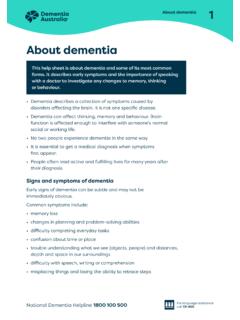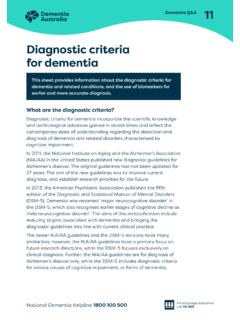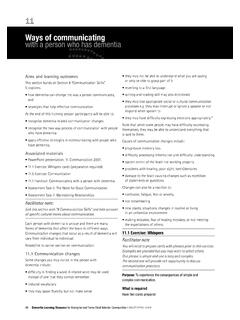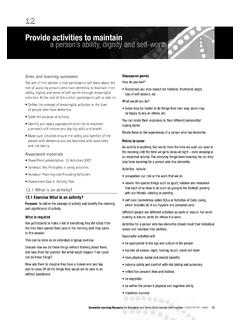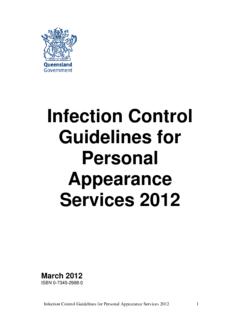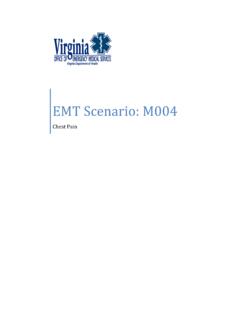Transcription of ANTIDEPRESSANTS AND DEMENTIA
1 ANTIDEPRESSANTS AND DEMENTIAD avid HughesMental Health Nurse Practitioner, Specialist Mental Health Service For Older People, ShoalhavenWith thanks to Dr Bev RayersOverview Neuropsychiatric symptoms in DEMENTIA Depression and diagnosis Why to treat, when to treat Why we try to avoid prescribing psychotropic drugs-the downfallsNeuropsychiatric symptoms in DEMENTIA Agitation Aggression Delusions Hallucinations Wandering Apathy Disinhibition Sleep disturbance DepressionDepression; Depression is a mood disorder causing persistent feelings of sadness and loss of interest. It affects how people feel, think and behave and can lead to a variety of emotional and physical problems including suicidal thoughts. Loss of productivity and carer stress can result in significant economic burden to a family and society Risk factors; Past history Family history Secondary to life changes (loss, grief, adjustment) Organic/neurological degenerative process Chronic pain Disability Medications Trauma historyDepression (continued) Depression is the most common mental health problem in the elderly Prevalence studies suggest 14% to 20% of the elderly living in the community experience depressive symptoms (but clinically diagnosed occurrence lower than in younger adults) Higher rates among the elderly in hospital (12% to 45%) Even higher rates in long-term care facilities (an estimated 40%)
2 Treatment of depression in the Elderly-the evidence Most depression studies have been conducted on younger populations When mixed-aged groups have been studied older adults have been underrepresented Often elderly or those with comorbid conditions are excluded from studies Limits the ability to generalize from these study findings when treating the elderly but increasing body of literature specific to the elderly Pharmacological and non pharmacological strategies are both usually helpfulIt can be difficult to diagnose depression in a person with DEMENTIA . Some characteristic signs are: Loss of interest and pleasure in previously enjoyed activities (anhedonia) Lack of energy Poor sleep Loss of appetite and weight Expressing feelings of worthlessness and sadness Being unusually emotional, crying, angry or agitated Increased confusionAgitation or aggression may be the primary manifestation of depressionTherapeutic trial of antidepressant medication may be only diagnostic strategy possibleAttributing cognitive impairment to the DEMENTIA or the depressive disorder may be difficult until an adequate trial of treatment for depression has in Diagnosis Communication difficulties caused by hearing or cognitive impairment, Absence of depressed mood or other classic diagnostic features Comorbidities with physical symptoms similar to mental disorder Stigma associated with mental illness that can limit the self-reporting of depressive symptoms.
3 Tendency for people to see their symptoms as part of the normal aging process, which they are not. Typically a major depressive episode develops over weeks to a few months, and is a significant new impairment for the person. Conversely, the DEMENTIA alone may develop insidiously over months or years and be slow in progressionGeriatric Depression Scale The Geriatric Depression Scale (GDS) is a validated screening tool for depression in the elderly that comes in two common formats: the 30-item (long form) and 15-item (short-form) self-rating scale. its reliability decreases with increasing cognitive impairment. If there is significant cognitive impairment, the Cornell Scale for Depression in DEMENTIA (CSDD) is the gold standard. Scores are determined by a combination of prior observation and two interviews: 20 minutes with the carer and 10 minutes with the of treatment: considerations Previous response to treatment; what has worked in past?
4 Type of depression-psychotic depression will likely not respond to antidepressant monotherapy, bipolar depression will require a mood stabiliser. Anxiety component will likely respond better to SSRI Other medical problems: caution not to worsen the condition or cause adverse events. eganticholinergics in DEMENTIA , cardiovascular problems, diabetes, and Parkinson s disease. Other medications: minimise drug-drug interactions Risk of overdose. Tricyclic ANTIDEPRESSANTS are lethal in overdose and are often avoided for this reason. Suicide Risk A person is at increased risk of suicide during the initial phase of treatment They will require increased monitoring and regular risk assessments Consider hospital admission if risk is high or there are no identified protective factors Risk usually diminishes after 2-3 weeks but variesDrugs to avoid Benzodiazepines of limited value in DEMENTIA AND have adverse effects Worsening gait Paradoxical agitation & disinhibition Physical dependence Increased confusionMay be useful in temporary stress ( change in residence, medical event, titration of other psychotropic medication) use those with short half Lorazepam.
5 Choice of antidepressant Several ANTIDEPRESSANTS are efficacious in elderly patients with a major depressive episode without psychotic features. Selection should be based on the best side effect profile and lowest risk of drug-drug interactions. SSRI s SNRI s Mirtazapine and Moclobemideare all relativelysafe in the elderly with similar efficacy Fluoxetine has a long half-life and greater drug interactions Paroxetine greater anticholinergic effect can be problematicSSRI and SNRI-Adverse Effects Common side effects of SSRIs : nausea, dry mouth, insomnia, somnolence, agitation, diarrhoea, sweating, andsexual dysfunction Hyponatraemia secondary to a syndrome of inappropriate antidiuretic hormone secretion. It affects 10% of patients taking ANTIDEPRESSANTS Hypertension; dose dependent (SNRI) Liver effects: Cholestatic jaundice Raised transaminase enzyme activities Falls GI BleedsTricyclic Adverse Effects Tricyclic s no longer considered first-line agents due to adverse effectsbut many older people have been taking them for decades Postural hypotension, which can contribute to falls and fractures Cardiac conduction abnormalities Anticholinergic effects-delirium, urinary retention, dry mouth, and constipation.
6 If chosen as a second-line medication, then nortriptylineoften best choice-less anticholinergic ECG and postural blood pressure prior to tricyclic antidepressant and after increasing the dose Tricyclic antidepressant blood levels should be monitoredMirtazapine, Moclobemideand MAOI adverse effects Mostly as for SSRI s Dyscrasias; (disorder of the blood) Given high rates of drug-drug interactions, and dietary restrictions, monoamine oxidase inhibitors (MAOIs) are usually reserved for treatment resistant depressionDosing Starting dose should be half that prescribed for a younger adult Start low and go slow Increase the dose regularly as tolerated at 1-to 2-week intervals in order to reach an average therapeutic dose more quickly Average therapeutic dose is typically lower but much individual variability If no improvement after 2 to 4 weeks on an average therapeutic dose, increase Regular follow-up visits to monitor efficacy, tolerance and compliance and titrating accordingly Monitor for any worsening of depression, agitation or anxiety, and suicide risk, especially in the early stages of treatment.
7 Maintenance Treat to remission If no improvement after 8 weeks change treatment Consider wash out period, cross titration possible with some combinations Sudden cessation (venlafaxine and paroxetine) can lead to a withdrawal syndrome that includes anxiety, If some improvement but not full remission consider augmentation (antidepressant of a different class, another agent such as lithium,psychotherapysuch as cognitive-behavioral therapy or interpersonal therapy-Limited efficacy in cognitive decline If a second antidepressant is added, monitor for the emergence of serotonin syndrome, Lithium; a special case Lithium is the gold standard when it comes to mood stabilisers Lithium requires diligent monitoring otherwise it may lead to kidney damage Lithium can affect thyroid & calcium levels NSAIDS should not be used The patient should ensure adequate fluid intake Diuretics should be used with cautious monitoring of levels & electrolytes Vomiting, diarrhoea or other causes of dehydration may risk toxicity ACUTE LITHIUM TOXICITY Symptoms include: Diarrhoea Dizziness Nausea Stomach pains Vomiting Weakness Hand tremors Lack of coordination of arms and legs Muscle twitches Seizures Slurred speech Uncontrollable eye movement Check bloods, reduce or cease lithium, urgent psychiatric reviewAugmentation Atypical antipsychotics used as add-on therapy in the treatment of depression shows some promise.)
8 2010 study showed efficacy for the use of adjuvant aripiprazolein older adults with an incomplete response to standard antidepressant treatment, both in terms of a significant reduction of depressive symptoms and improvement in remission rates. Risperidone, olanzapine or quetiapine are other options In severe cases of treatment resistant depression ECT maybe indicatedOn the importance of monitoring Regular pathology because of the risks of hyponatraemia -(U&E) , blood dyscrasia, GI bleeds (FBC) and liver dysfunction (LFT). These should be done at commencement (baseline), once stable on medication and then every 3 months or at any change in presentation, in particular confused state Lithium should be done more often-after any change in circulating volume (D&V etc), infection, change of other meds as well as every 3 months along with renal function and TFT every 6 months. Baseline ECG as all psychotropics can affect cardiac function Antipsychotic Treatment Older (first generation) more Extrapyramidal Side Effects Risperidone for BPSD (PBS restriction) Quetiapine likely to be safest in Parkinson s Very low doseAdverse effects of antipsychotics in elderly Metabolic syndrome (Endocrine effects)-Weight gain, Diabetes mellitus Cardiac (ECG) changes prolonged QT interval and risk of arrhythmias Postural hypotension Movement disorders.
9 EPSE, Akathisia, Acute dystonia, Tardive dyskinesia Anticholinergic effects Hypersalivation GI effects Nausea, Constipation, Diarrhoea Altered liver function Atypical Antipsychotics in DEMENTIA Absolute mortality risk increase of 1% over about 10 to 12 weeks of treatment NNH 100 when antipsychotics were compared with placebo in patients with DEMENTIA 1 in 20 (NNH) over a 12 month period x increased risk of strokeSummary Exclude medical cause for neuropsychiatric symptoms Try environmental behavioural and non pharmacological therapies first Exercise caution with all psychotropic drugs Most ANTIDEPRESSANTS increase the risk of hyponatraemia, falls, GI bleeds, and ECG changes Antipsychotics can cause strokes and shorten life expectancy (in 1 in 20 people treated for one year) Risk v benefit analysis in all cases-aim is usually to improve quality of life & reduce distress-discuss openly with guardian the associated risks.
10 Thank You. And don t Management of depression in a person with DEMENTIA should be enthusiastic with an aim to optimise quality of life ( Kitching, Senior psychiatry specialist, Concord Hospital, Sydney)



